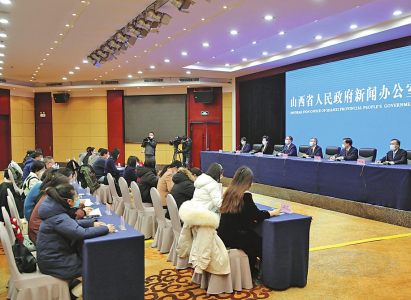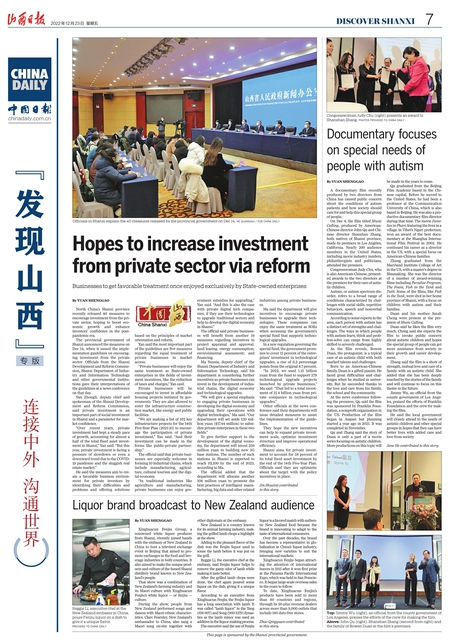Hopes to increase investment from private sector via reform
Businesses to get favorable treatment once enjoyed exclusively by State-owned enterprises

Officials in Shanxi explain the 40 measures released by the provincial government on Dec 14. He Guanghui / For China Daily
North China's Shanxi province recently released 40 measures to encourage investment from the private sector, hoping to boost economic growth and enhance investors' confidence in the post-pandemic era.
The provincial government of Shanxi announced the measures on Dec 14, when it issued the implementation guidelines on encouraging investment from the private sector. Officials from the Shanxi Development and Reform Commission, Shanxi Department of Industry and Information Technology and other governmental institutions gave their interpretations of the guidelines at a news conference on that day.
Yan Zhongli, deputy chief and spokesman of the Shanxi Development and Reform Commission, said private investment is an important part of social investment in Shanxi and a parameter for market confidence.
"Over recent years, private investment had kept a steady pace of growth, accounting for almost a half of the total fixed asset investment in Shanxi," Yan said. "But this year, private investment is facing a pressure of slowdown or even a downward trend due to the COVID-19 pandemic and the sluggish real estate market."
He said the measures aim to create a favorable business environment for private investors by identifying their difficulties and problems and offering solutions based on the principles of market orientation and reform.
Yan said the most important part of the guidelines are five measures regarding the equal treatment of private businesses in market access.
"Private businesses will enjoy the same treatment as State-owned enterprises in the fields of investment incentives, like the reduction of taxes and charges," Yan said.
Private businesses will be encouraged to invest in affordable housing projects initiated by governments. They are also allowed to enter the infrastructure construction market, like energy and public facilities.
"We are making a list of 102 key infrastructure projects for the 14th Five-Year Plan (2021-25) to encourage the participation of private investment," Yan said. "And their investment can be made in the forms like public-private partnership."
The official said that private businesses are especially welcome in forming 10 industrial chains, which include manufacturing, agriculture, cultural tourism and the digital economy.
"In traditional industries like agriculture and manufacturing, private businesses can enjoy government subsidies for upgrading," Yan said. "And this is also the case with private digital tech companies, if they use their technologies to upgrade traditional sectors and help to develop the digital economy in Shanxi."
The official said private businesses will benefit from another 19 measures regarding incentives in project appraisal and approval; land leasing; energy consumption; environmental assessment; and financing.
Ma Yunxia, deputy chief of the Shanxi Department of Industry and Information Technology, said his department is considering further incentives so private businesses can invest in the development of industrial chains, the digital economy and technological upgrades.
"We will give a special emphasis to engaging private businesses in developing the digital economy and upgrading their operations with digital technologies," Ma said. "Our department will set aside 120 million yuan ($17.44 million) to subsidize private enterprises in these two fields."
To give further support to the development of the digital economy, the department will invest 250 million yuan in building new 5G base stations. The number of such stations in Shanxi is expected to reach 92,100 by the end of 2023, according to Ma.
The official added that the department will allocate another 108 million yuan to promote the best practices of intelligent manufacturing, big data and other related industries among private businesses.
Ma said the department will give incentives to encourage private businesses to upgrade their technologies. These companies can enjoy the same treatment as SOEs when accessing the government's special fund that supports technological upgrades.
In a new regulation governing the special fund, the government promises to cover 15 percent of the enterprises' investment in technological upgrades, a rise of 6.3 percentage points from the original 8.7 percent.
"In 2022, we used 1.15 billion yuan from the fund to support 279 technological upgrade projects launched by private businesses," Ma said. "That led to a total investment of 21.4 billion yuan from private companies in technological upgrades."
Other officials at the news conference said their departments will issue detailed measures to assist the implementation of the guidelines.
They hope the new incentives can help to expand private investment scale, optimize investment structure and improve operational efficiency.
Shanxi aims for private investment to account for 58 percent of its total fixed asset investment by the end of the 14th Five-Year Plan. Officials said they are optimistic about the target with the policy incentives in place.
By Yuan Shenggao
Jin Shuaini contributed to this story.











